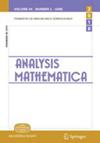\(1/(1-\cos(x) )\)及其导数的不等式
IF 0.5
3区 数学
Q3 MATHEMATICS
引用次数: 0
摘要
证明了函数\(g(x)= 1 / ( 1 - \cos(x) )\)在\((0,\pi]\)上是完全单调的,在\([\pi, 2\pi)\)上是绝对单调的,并确定了\(\lambda_n\)和\(\mu_n\)的最佳可能界,使得不等式$$\lambda_n \leq g^{(n)}(x)+g^{(n)}(y)-g^{(n)}(x+y) \quad (n \geq 0 \ \mbox{even})$$和$$\mu_n \leq g^{(n)}(x+y)-g^{(n)}(x)-g^{(n)}(y) \quad (n \geq 1 \ \mbox{odd})$$对所有\(x,y\in (0,\pi)\)和\(x+y\leq \pi\)都成立。本文章由计算机程序翻译,如有差异,请以英文原文为准。
Inequalities for \(1/(1-\cos(x) )\) and its derivatives
We prove that the function \(g(x)= 1 / ( 1 - \cos(x) )\) is completely monotonic on \((0,\pi]\) and absolutely monotonic on \([\pi, 2\pi)\), and we determine the best possible bounds \(\lambda_n\) and \(\mu_n\) such that the inequalities
$$
\lambda_n \leq g^{(n)}(x)+g^{(n)}(y)-g^{(n)}(x+y) \quad (n \geq 0 \ \mbox{even})
$$
and
$$
\mu_n \leq g^{(n)}(x+y)-g^{(n)}(x)-g^{(n)}(y) \quad (n \geq 1 \ \mbox{odd})
$$
hold for all \(x,y\in (0,\pi)\) with \(x+y\leq \pi\).
求助全文
通过发布文献求助,成功后即可免费获取论文全文。
去求助
来源期刊

Analysis Mathematica
MATHEMATICS-
CiteScore
1.00
自引率
14.30%
发文量
54
审稿时长
>12 weeks
期刊介绍:
Traditionally the emphasis of Analysis Mathematica is classical analysis, including real functions (MSC 2010: 26xx), measure and integration (28xx), functions of a complex variable (30xx), special functions (33xx), sequences, series, summability (40xx), approximations and expansions (41xx).
The scope also includes potential theory (31xx), several complex variables and analytic spaces (32xx), harmonic analysis on Euclidean spaces (42xx), abstract harmonic analysis (43xx).
The journal willingly considers papers in difference and functional equations (39xx), functional analysis (46xx), operator theory (47xx), analysis on topological groups and metric spaces, matrix analysis, discrete versions of topics in analysis, convex and geometric analysis and the interplay between geometry and analysis.
 求助内容:
求助内容: 应助结果提醒方式:
应助结果提醒方式:


